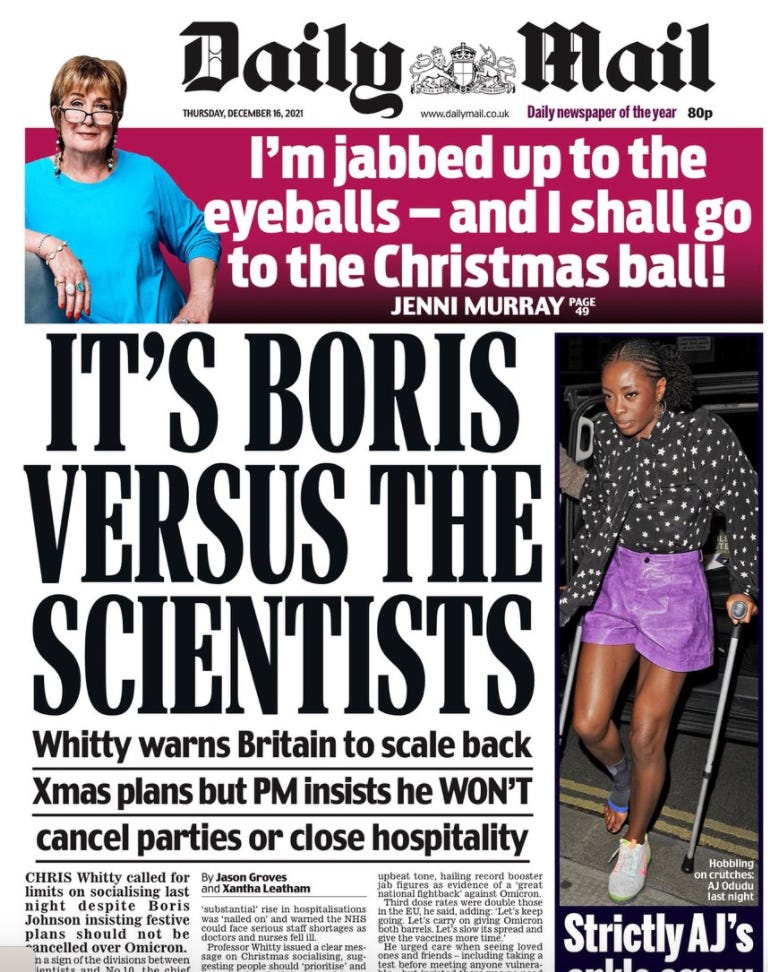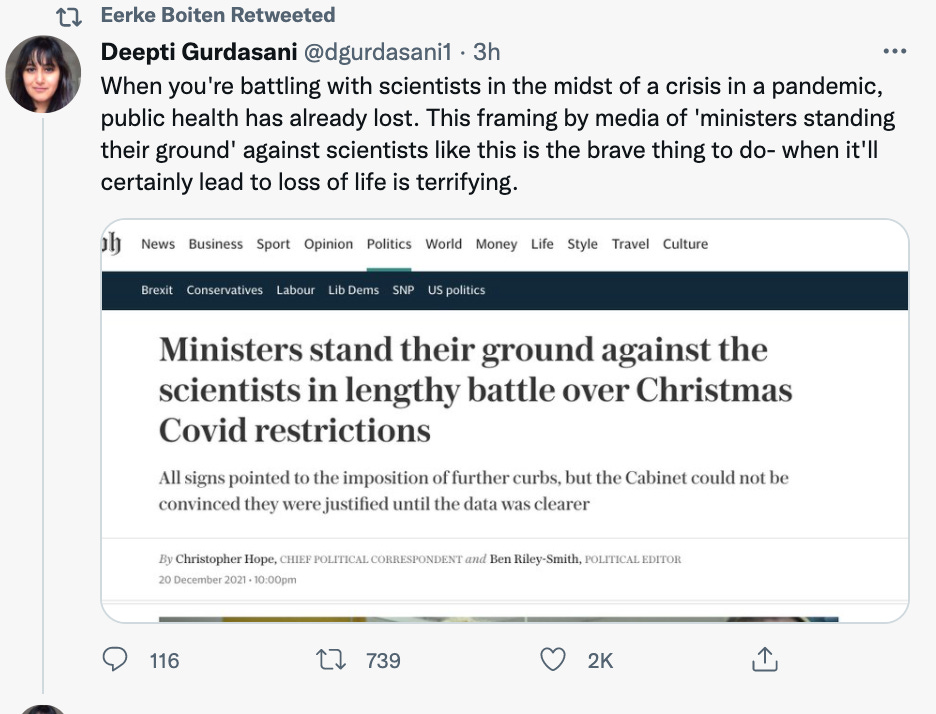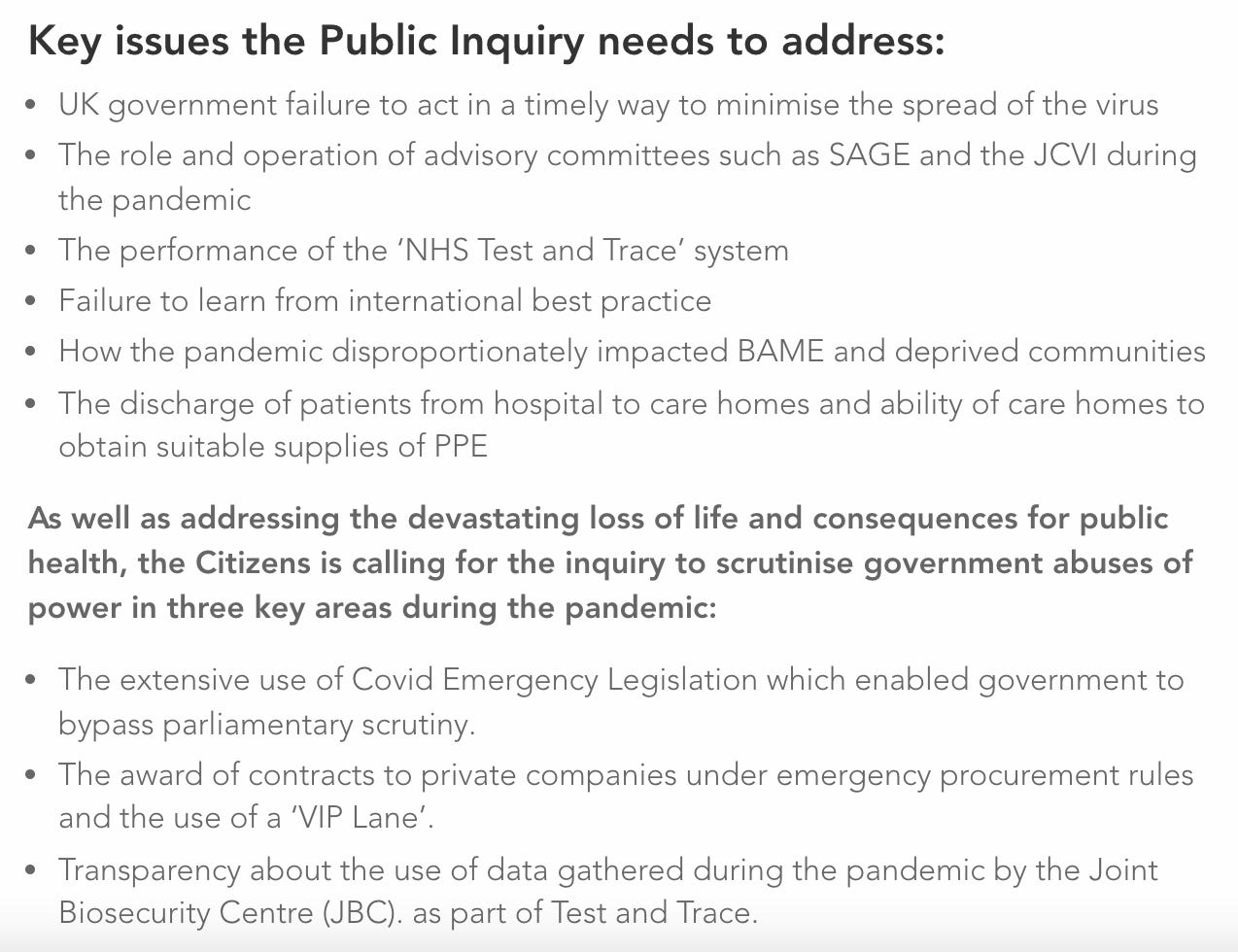It’s beginning to look a lot like last Christmas
The need for a transparent and fair Covid public inquiry has never been stronger
Welcome to Keeping the Receipts— a newsletter from the Citizens, this week written by Joanne O’Connor. You can read about the mission behind this here. If you like what you see, consider forwarding it to a friend or two. And if you’ve been reading it for free and want to support our mission, please consider signing up to the paid version.
The countdown to Christmas 2021 has brought with it a strong sense of déjà vu: a worrying new variant, infections climbing, scientists calling for urgent action, the NHS struggling, Christmas plans thrown into confusion and Boris Johnson…doing nothing.
Like a shit advent calendar, each new day of December has brought with it a depressing new revelation or headline. But, in a crowded field, this front page from the Daily Mail last week, perhaps takes the prize:
This is not just a case of the Daily Mail doing what it does best. It’s part of a bigger and more worrying picture, whereby scientists and experts are being set up, by some parts of the government and media, as the enemy. On one side are Boris Johnson and his band of jolly elves battling to “save Christmas” and on the other, the scare-mongering scientists and NHS doctors trying to steal our fun. And as Dr Deepti Gurdasani, clinical epidemiologist and senior lecturer at Queen Mary University of London, points out, it’s terrifying.
It’s terrifying because we know what happens when the government ignores the scientists. We’ve seen this movie before. And it really doesn’t end well.
The public inquiry into the UK’s Covid response will begin next spring. The government appointed Baroness Heather Hallett as chair of the inquiry last week and will release the ‘terms of reference’ and details of the panel in the new year. It’s vital that this inquiry is rigorous and that it is conducted in a way that is open, transparent and fair, and that it fully represents those who were most impacted by the pandemic, including BAME communities, the elderly and the clinically vulnerable.
But we can’t leave this to chance. Time and again this government has shown its contempt for truth and transparency. It’s why we created Independent SAGE at the start of the pandemic and it’s why we’re now trying to build a coalition of scientists, experts and bereaved families to hold this government to account and to ensure that we get the answers we deserve. This short film explains what we’re trying to achieve:

The Citizens and Independent SAGE will each be applying for ‘core participant’ status in the inquiry and we’ve each drawn up a list of key issues that we believe the inquiry needs to address. Because if you don’t ask the right questions, you won’t get the right answers. Independent SAGE has published its suggested Terms of Reference for the inquiry on its website. And there’s a snapshot here of some of the key issues:
170,000 people in the UK have died so far and many more are living with chronic illness. We want to hold this government to account, to get answers for the families who have lost loved ones and to make sure we don’t keep repeating the same mistakes over and over again.
If you would like to support our work, please consider donating to our Crowdfunder or subscribing to this newsletter.
Q&A with Dr Deepti Gurdasani, clinical epidemiologist and senior lecturer at Queen Mary University of London
Deepti Gurdasani has been one of the most fearless and astute critics of this government’s pandemic response from the beginning and we’re delighted to be working alongside her in our campaign for a fair and transparent Covid inquiry. Her mix of razor-sharp analysis and compassion have earned her a huge following on social media and countless media appearances, but it’s come at a high price. We spoke to her about the forthcoming Covid inquiry and the personal and professional cost of speaking out.
Looking back to the start of the pandemic, at what point did you realise that the government didn’t have a grip on what was happening?
For me, the really terrifying part was in March 2020 when we heard Patrick Vallance talk about herd immunity. And many of us were thinking, why have we made this decision to let a novel virus, that's highly fatal, run through the population when every other country seems to be taking steps to prevent that? And that was terrifying at a professional level, and at a personal level. And it was offensive to my sense of justice, because we knew the majority of those people who would be impacted would be people who were elderly, people who were already disadvantaged, poor or vulnerable. And I thought, you have to speak up, because as a scientist, if you don't speak up, then you're complicit in what happens next, which will be hundreds of thousands of people dying.
What questions does the Covid public inquiry need to answer?
We've lost almost 170,000 lives to Covid in this pandemic, and we have more than one million people living with chronic illness. We need to understand why that happened, and whether that was inevitable and at what cost government policies came to many, many people. Because almost every person across the UK has been affected by this pandemic. And it's very important that we get these answers for them.
It's vital that this inquiry is transparent, it’s open to the public, it’s independent and particularly represents those people who've been impacted the most; ethnic minorities, people who are vulnerable, people who are disabled and the elderly, who were hung up to dry during this process.
How damaging has the lack of transparency been?
The lack of transparency in the pandemic has been shocking. Right at the beginning, we didn't know the membership of SAGE. We didn't know what evidence was being used to make the decisions. We didn't have access to the SAGE minutes. Even now, there's absolutely no transparency for decisions being made. For example, the policy on delaying vaccination in children. The evidence for the decision [by the Joint Committee on Vaccination and Immunisation] still hasn't been released. When we put in Freedom of Information requests to ask for evidence for why masks were removed from secondary schools when the Delta variant was spreading rapidly, we were told that the public interest in not releasing this information is higher than the public interest in releasing it, which is frankly ridiculous. This is not even information we should be asking for. This should be given openly and transparently to develop public trust.
You’ve been very critical of the lack of mitigations in schools and delays in vaccinating children. How frustrating has the lack of action been for you, as a scientist and as a parent?
One of the areas of ongoing failure of government policy has been protecting children who have had some of the highest infection rates throughout. We know that Long Covid in children is now much more common and yet there is hesitancy about vaccinating children. There is hesitancy about putting the most basic mitigations in schools. As a parent, I feel outraged, but I also feel helpless and anxious. Every day, sending my daughter to school is a Russian roulette, because there may well be children who are infected there. I'm on immuno-suppressive medication and I know that for me, it could be the difference between life and death. But the only choice I have, if I don't want to send her to school, is to home school her, which I'm not able to do because I have a chronic disability. So there are no choices for parents like me.
Since the start of the pandemic you’ve made dozens of media appearances and built up a big following on social media, what’s it been like being in the public eye?
One thing that I realised during the course of this pandemic was the horrific targeting that you face as an academic when you speak out. And a lot of this bullying comes from your own colleagues. There is a huge element of misogyny in it. And it's worse for people of colour. Social media brings this all into the open so you can compare the way I'm treated and the way my colleagues are treated and it's remarkably different.
I've had complaints to my employers about me, I have colleagues who've got death threats. I'm calling it trolling, because I don't know what the other word would be. But it doesn't really capture how horrific it is to be on the other end of it.
It creates a level of trauma, which means that, after a while, you ask yourself is it worth it? And if you think it's not worth it, you just don’t [speak out], which means over time we lose voices – important voices who are putting information out there, challenging misinformation.
I've definitely become less vocal on Twitter. I do a lot less media now. Because I find that the personal cost is huge, not just for me, for my family, because it affects all of us. And it's sad and I feel guilty. But the impact it's had on my mental health has been huge. And at some point, I do have to protect myself as well.
Why is this Covid inquiry so important?
If you look at the three lockdowns we've had, all of them were delayed against scientific advice. And that led to tens of thousands of people dying who didn't have to die. So I think we need this inquiry not just to deal with the past, but also to ensure that we never make these mistakes again – mistakes that have cost many lives. And if everything is brushed under the carpet, there won't be justice for the many families who've lost loved ones. I think there will be huge levels of trauma. They need this inquiry to be honest and truthful and independent. There is no other way, given the huge impact that this has had on almost every person's life during the last two years.
Happy Christmas and thank you!
Amplifying the voices of experts and fellow organisations who are working to defeat disinformation and hold power to account is at the heart of our mission and Deepti is just one of the many inspiring individuals we’ve been lucky enough to work with over the past 12 months.
From the Nobel prize-winning journalist Maria Ressa, who is an adviser to the Citizens and sits on the Real Facebook Oversight Board, to the scientists and public health experts of Independent SAGE who show up week in week out to interpret and share the data and science behind the pandemic, we’ve been fortunate to have benefited from the expertise, wisdom and time of some inspiring colleagues and allies.
This is our last newsletter of the year so all that remains is to wish you a safe, happy and healthy Christmas and to thank you for your continuing support. We really couldn’t do this without you.







Thank you - and more power to your elbow in 2022. We need you!
🙏🤞
Keep up the good (hard) work!
Thank you!